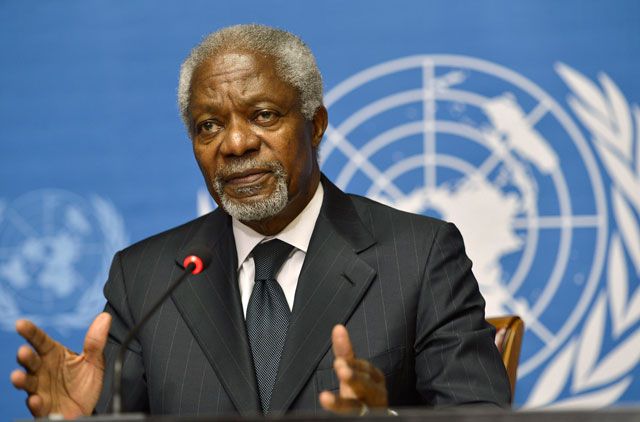Geneva: Kofi Annan said Thursday he will quit his high-profile role as special envoy to Syria at the end of the month, delivering blistering criticism of world powers' failure to unite to stop the country's escalating violence.
Annan told reporters that when he accepted the job, "which some called 'Mission Impossible'" — he wanted to help the international community, led by the U.N. Security Council, find a peaceful solution to the crisis. The goal was to stop the killings of civilians and human rights abuses, as well as to place Syria on a path toward political transition.
"The severity of the humanitarian costs of the conflict, and the exceptional threats posed by this crisis to international peace and security, justified the attempts to secure a peaceful transition to a political settlement, however daunting the challenge," Annan said.
But the former U.N. secretary-general told reporters that he cannot go on when the New York-based, 15-nation Security Council doesn't back his role, particularly because of the standoff between its five veto-wielding members: Russia and China on one side, the United States, Britain and France on the other.
"Things fell apart in New York," he summed up. "The increasing militarisation on the ground (in Syria) and the clear lack of unity in the Security Council have fundamentally changed the circumstances for the effective exercise of my role."
Annan was named the U.N.-Arab League envoy to Syria in February, overseeing a small staff in a secretive office in the sprawling Palais des Nations, the U.N.'s European headquarters in Geneva. He came up with a six-point peace plan to resolve the crisis in the Arab state, including a cease-fire that was supposed to take effect in mid-April.
But, despite the presence of hundreds of U.N. observers on the ground, the cease-fire never took hold and the violence in Syria has morphed into a civil war. Rights activists say that more than 19,000 people have died since the popular uprising against Syrian President Bashar Assad began in March 2011.
"The bloodshed continues, most of all because of the Syrian government's intransigence, and continuing refusal to implement the six-point plan, and also because of the escalating military campaign of the opposition — all of which is compounded by the disunity of the international community," Annan told reporters in Geneva.
"At a time when we need — when the Syrian people desperately need action — there continues to be finger-pointing and name-calling in the Security Council."
On June 30, Annan succeeded in getting the major powers on the council — including stalwart Syria allies Russia and China — to agree on a broad framework for a political transition in Syria. But the Security Council never formally endorsed the plan or acted on it, something that sorely disappointed the envoy and, he said, undermined his efforts.
Annan did not single out any country for criticism, but said, "Without serious, purposeful and united international pressure, including from the powers of the region, it is impossible for me, or anyone, to compel the Syrian government in the first place, and also the opposition, to take the steps necessary to begin a political process."
"You have to understand: as an envoy, I can't want peace more than the protagonists, more than the Security Council or the international community for that matter," he said.
Annan's announcement coincided with Arab countries dropping a demand that Assad resign in the latest draft of a symbolic U.N. General Assembly resolution that faces a Friday vote in New York. The watered-down resolution further illustrated the international struggle to build an effective diplomatic approach to Syria's civil war.
The draft resolution was resisted by countries such as Brazil, Russia, India, China and South Africa who had problems with calling for regime change or sanctions. Russia and China have repeatedly vetoed stronger proposals on Syria in the Security Council, which, as the most powerful arm of the U.N., can adopt enforceable resolutions and impose sanctions.
British Prime Minister David Cameron said Annan's resignation was evidence that the current approach has failed — and that the U.N. needs to get tougher with Syria.
"We've got this appalling bloodshed. I think what we need to do is to ramp things up," Cameron told Sky News television.
U.N. Secretary-General Ban Ki-moon said he accepted the resignation with deep regret, and is discussing possible successors with the Arab League. "I remain convinced that yet more bloodshed is not the answer" each day of it will only make the solution more difficult while bringing deeper suffering to the country and greater peril to the region," Ban said.
Russia's U.N. envoy Vitaly Churkin said Moscow also regrets Annan's departure but is encouraged by Ban's search for a successor, the RIA Novosti news agency reported.
Asked about the idea of a successor being appointed, Annan said, "The world is full of crazy people like me, so don't be surprised if someone else decides to take it on."












